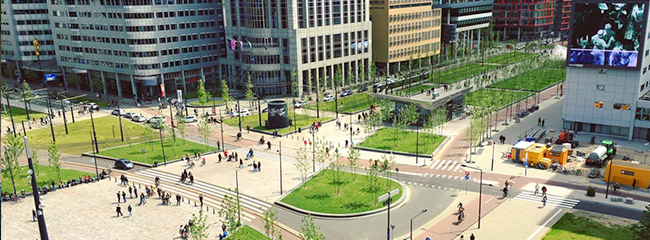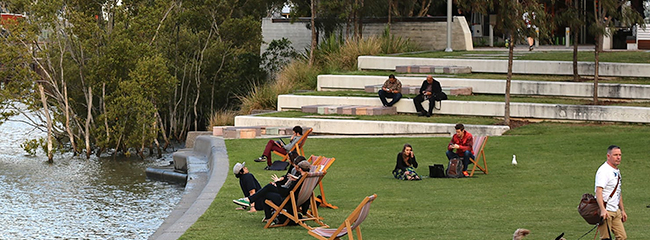From research to action (Part 1)
Reflecting on knowledge gained since 2012: Engaging hearts and minds
Since its start in 2012, early steps by the CRC for Water Sensitive Cities (CRCWSC) to help enable sustainable water futures have accelerated when it comes to finding innovative, integrated, practical solutions for creating cities that are liveable, resilient, sustainable, and productive.
The solutions are timely. While centrally managed water sources such as water piped from dams over large distances have served the community well, recent experience highlights that by themselves, such sources will not be enough for a rapidly growing Australian population of urban water users, particularly with the future challenges of climate change.
Those drivers are why the CRCWSC and its 83+ partners are achieving change. Generating the knowledge required has involved 38 projects across four diverse Programs: Society (A), Water Sensitive Urbanism (B), Future Technologies (C), and Adoption Pathways (D). New knowledge developed so far is already being applied. It is influencing policy such as Water for Victoria, Victoria’s state plan for water; strategies (such as Transition Strategies and the Water Sensitive Cities Index); and practice, through outcomes such as the Water Sensitive Cities Toolkit.
With the first tranche of research almost complete, now is a fitting time to reflect on the research, and just some of the insights that are enabling impact.
This month, we take a snapshot look at Program A – with Programs B, C, and D to follow.

Changing minds to change behaviour
How do cities build a water sensitive vision, and how can people be guided to translate this vision into practice?
These critical questions were the drivers of Program A (Society), which examined the changes in community attitudes, water-related behaviour, institutions, and economic valuation required for sustainable water use and management. Through twelve distinct projects, the program explored the potential barriers to new water regimes – and how to overcome them – among stakeholders such as governments, policy-makers, urban designers, engineers, and the community of urban water users.
As one of several important foci, the first cluster of Program A projects investigated the urban community’s economic valuation of water. Understanding which proposed new water management strategies would elicit the community’s willingness to pay helps to guide corresponding state government policy and funding support. With stormwater reuse a primary strategy proposed for achieving water sensitive cities, one study undertaken (as part of Project A2.1) asked: “What benefits of stormwater management are we prepared to pay for?”
The research showed that consumers generally understand the value of more sustainable water management but, with respect to stormwater, they are more prepared to pay for some aspects of stormwater management than others. Results from surveys across Sydney and Melbourne showed that many residents would strongly support a cost for access to healthy natural waterways and freedom from water restrictions.

Many also appreciate the cooler, greener cities that sustainable water management and fit-for-purpose water can provide, but protection from flooding was a priority only among urban residents who had recently faced severe rain events, indicating that recent experience would influence which strategies residents were likely to support at any given time.
Changing entrenched water-use norms on the scale required to create water sensitive cities relies on a strategic approach, and creating the ingredients for potential transitions took shape within a second cluster of Program A projects. With behaviour change one of those important ingredients, one project developed a diagnostic survey tool that measures the community’s cognitive, emotional and behavioural engagement in water conservation. This makes it possible to gauge who within a stakeholder community is supportive of, and who is disinterested in, a set of proposed changes.
Monash University’s Dr Briony Rogers, co-project leader of Project A4.2 (Mapping water sensitive city scenarios) and leader of the Tranche 2’s transition-focussed Integrated Research Project 1, reflects on the enthusiasm generated by, for example, participatory visioning workshops for Greater Perth, where traditional water resources are depleting.
Somewhat predictably, the research clearly showed that industry jargon – the common language of researchers and policy-makers – does not engage the hearts and minds of other critical stakeholders, such as community members, and should be avoided in many contexts. But the impact of this dedicated research is growing fast, with initiatives such as an exciting upcoming CRCWSC “Water Words” platform set to help water professionals and communicators better fit their communications to their target audiences.
Yet perhaps the most consistent message across Program A research is the critical role of knowledge and communication. Without knowledge acquired from personal experience or carefully targeted education, there was little or no support for water sensitive city practices and the likelihood of any changes in practices was limited.
Sharing knowledge about the risks of current water management, technological solutions, and the benefits of proposed changes, however, is an effective first step to building the cognitive and emotional capital necessary for delivering a vision for a water sensitive city – and the impetus to begin the change.
With insights flowing from a huge diversity of program research, we will next be sharing reflections on five years of research in Water Sensitive Urbanism (Program B), to celebrate the breadth of knowledge now feeding into growing impact and a movement towards water sensitive cities.
Make sure look out for it in the next edition!
Nicola Markus for the Mind Your Way team.